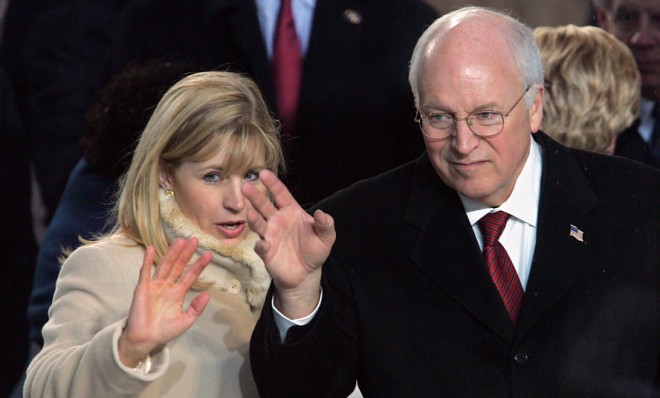The 'Cheneyization' of the Republican Party
Plenty of conservatives are mad about Liz Cheney's quixotic Senate bid. But her aggressively ultra-partisan attitude fits in perfectly with today's GOP.

A free daily email with the biggest news stories of the day – and the best features from TheWeek.com
You are now subscribed
Your newsletter sign-up was successful
When Liz Cheney, the outspoken elder daughter of Vice President Dick Cheney, announced this month that she was launching a primary challenge against three-term incumbent conservative Sen. Mike Enzi (R-Wyo.), she declared that it's "time for a new generation to come to the fore" and "time for us to say to ourselves, 'Can we continue to go along to get along in Washington?'"
While much attention has focused on the civil war between conservative GOPers in Wyoming, the bigger issue is that Cheney's quest is symbolic of how the Republican Party has evolved — and where it now seems to be inexorably headed.
Cheney has said it's time for GOPers to stop "cutting deals" with Democrats — a curious charge since few political analysts would say that today's Congress is known for its bipartisan deal-making. But Cheney is presenting herself as a Tea Party Republican representing a wave of the future that extends far beyond the Wyoming Senate seat.
The Week
Escape your echo chamber. Get the facts behind the news, plus analysis from multiple perspectives.

Sign up for The Week's Free Newsletters
From our morning news briefing to a weekly Good News Newsletter, get the best of The Week delivered directly to your inbox.
From our morning news briefing to a weekly Good News Newsletter, get the best of The Week delivered directly to your inbox.
Now, the conventional wisdom — and polling — suggest she's going to lose in Wyoming. A Public Policy Polling poll finds Enzi leads Cheney 54 percent to 26 percent among GOP primary voters. Republicans have been coming out in droves to either back Enzi or wonder aloud why such a reliable conservative is being challenged. Sen. John McCain (R-Ariz.) told CNN's Candy Crowley that most people he served with support Enzi, who he called the "epitome of a workhorse in the Senate." Some wonder if Cheney is committing career suicide by taking on a respected conservative in Wyoming — when until recently she resided in Virginia.
But voters haven't always been concerned about carpet-bagging. One of the most famous races where the charge flopped was in 1964, when moderate Republican Sen. Kenneth Keating lost his re-election bid to Democrat Robert F. Kennedy in 1964 in the New York race for the U.S. Senate. Kennedy had only spent part of his childhood there.
Regardless of her chances, let's view Cheney's race this way: Liz Cheney's candidacy isn't just about extending the Cheney political franchise into new generations the way the Kennedys, Bushes, Pauls, and Cuomos have done. It's about voters perpetuating and rewarding a less civil, less bipartisan, more confrontational, and more personal style of politics where attack and lashing out nearly become its entire substance.
This was typified in 2004 when Vice President Dick Cheney argued with Vermont's Democratic Sen. Patrick Leahy, who was criticizing Cheney over his ties to Halliburton and President George W. Bush's judicial nominees. Cheney famously gave this thoughtful rejoinder to the criticism: "F--- yourself." Cheney never expressed serious regret and would even smile when asked about it. This couldn't be confused with the way George H. W Bush or George W. Bush did political business.
A free daily email with the biggest news stories of the day – and the best features from TheWeek.com
Cheney was one of the most powerful, inflexible — and unpopular — vice presidents in American history, and the country's most famous neo-con. He left office with a 29 percent approval rating, which later rose a bit. And once Barack Obama became president, Cheney became one of his harshest — and most predictable — critics.
There is almost a mindmeld between his harsh rhetoric and that of the Tea Party and the conservative entertainment media. And, as Politico's James Hohmann notes, between the elder Cheney and his daughter:
Liz Cheney is, unapologetically, Dick Cheney's avatar: She co-wrote his autobiography, defends him like a pit bull and almost always is his sidekick at public appearances. Her inseparability from such a polarizing figure might seem like a big drawback — but in Wyoming, it may actually be her best shot at winning a U.S. Senate seat. Disliked as Dick Cheney is nationally after his controversial tenure as vice president, he remains an esteemed figure in the state he represented three decades ago in the House of Representatives. [Politico]
The two Cheneys' attitude about seriously working with the other side fits right in with what Washington Post columnist Eugene Robinson says is the "new normal" — GOP obstructionism as a policy, something The Daily Beast's Michael Tomasky correctly notes is unprecedented in modern times:
The Republican Party now sees dysfunction as not just an unfortunate consequence of a set of historical factors, something that they might work every now and again to correct. Now, the Republican Party sees dysfunction as its mission... It's absolutely new in American history... This isn't a partisan crisis. It's a historical crisis. [Daily Beast]
Joe Gandelman is a syndicated columnist for Cagle Cartoons and is the editor of The Moderate Voice blog.